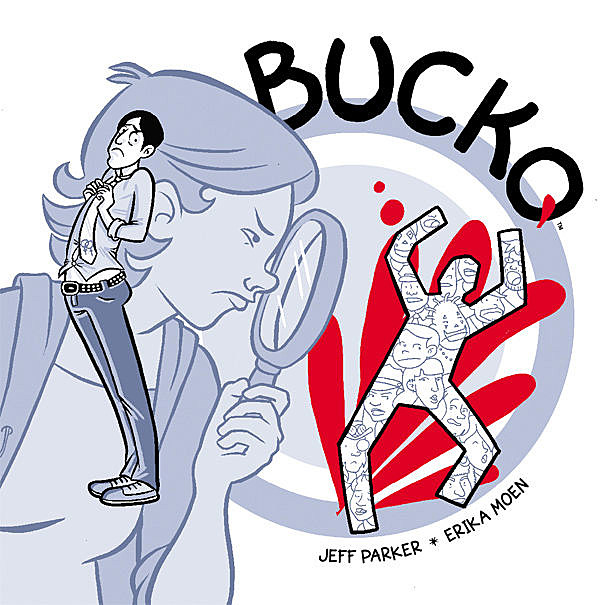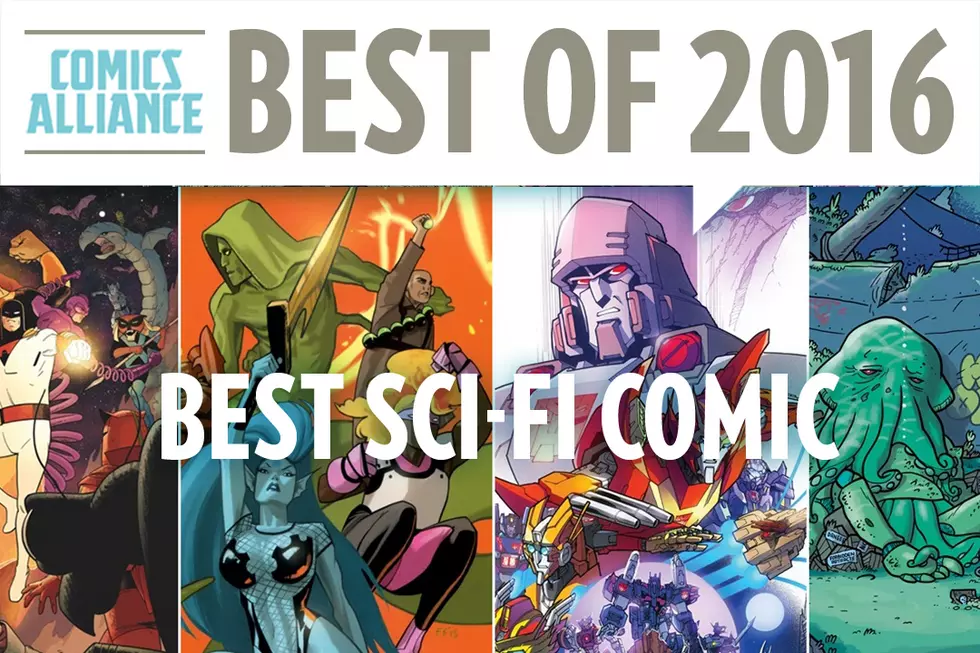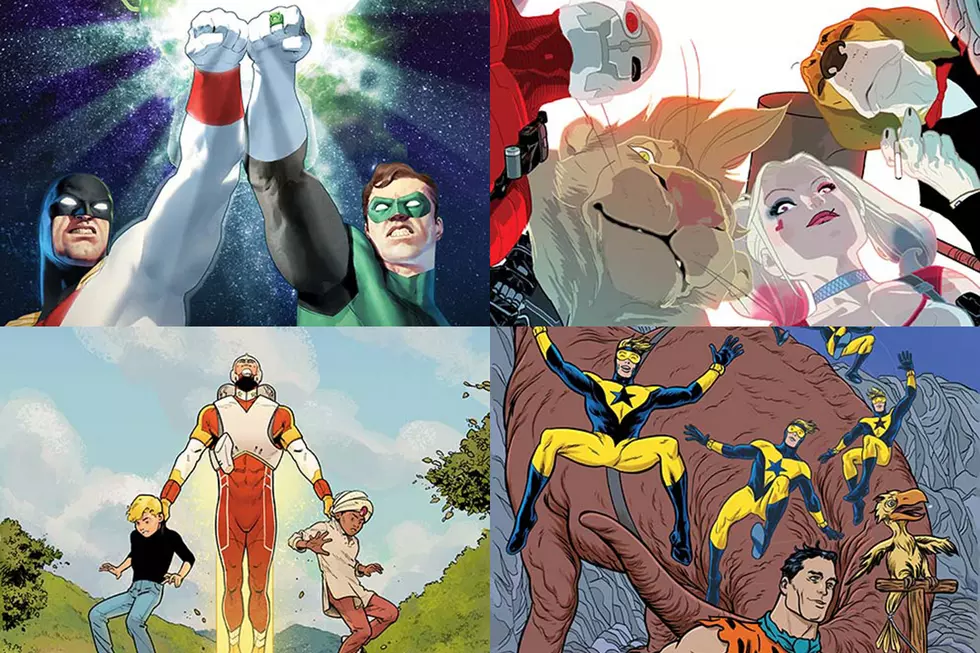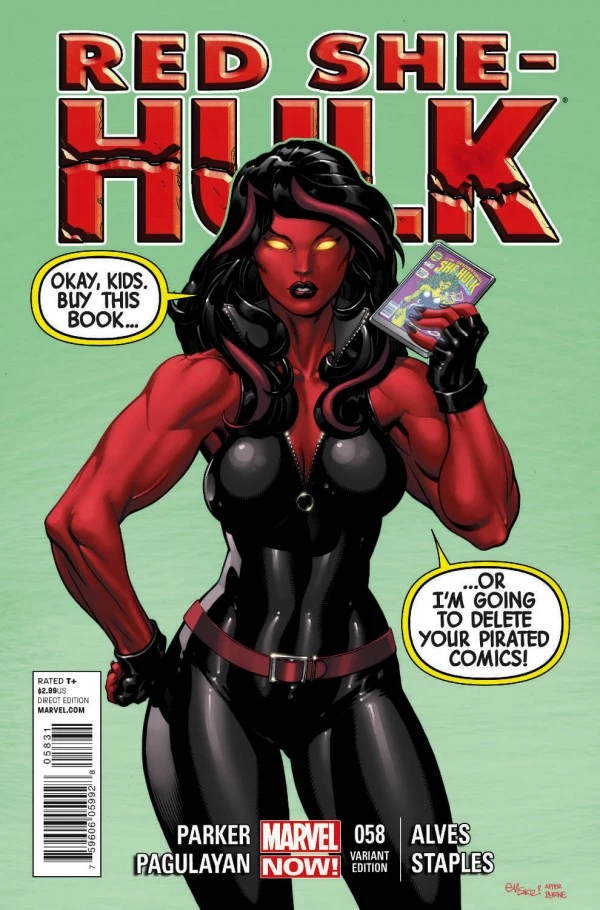![Furious Five With Jeff Parker: The Emerald City Comicon Edition [Interview]](http://townsquare.media/site/622/files/2013/03/jeff-parker-agents-atlas-heroclix.jpg?w=980&q=75)
Furious Five With Jeff Parker: The Emerald City Comicon Edition [Interview]

Seattle's Emerald City Comicon kicked off the convention season of 2013 with the city's largest gathering of creators, comic retailers, and cosplayers. In celebration of that beloved of all seasons -- which has now managed to stretch to three-quarters of a year -- we bring to you our Furious Five feature -- five creators, five questions each. Allow ComicsAlliance to be your Grandmaster Flash as we race through the best of Emerald City Comicon. First up? The illustrious creator Jeff Parker of Agents of Atlas, Red She-Hulk, BUCKO, and Willow fame.
ComicsAlliance: In the promotional blurbs regarding your Emerald City Comicon Parker/Brothers panel with David Brothers you mentioned the need for a writer to stop being a fan in order to be an effective writer. Later, when ComicsAlliance editor-in-chief Joe Hughes brought up Dan Slott as an example of a successful writer who truly embraces his inner fan, you agreed and amended your statement -- the fan should be present but not given control of the story. It is almost akin to the fan being a passenger in the writer's car. The writer establishes the direction; the fan occasionally comments on the scenery. If so, what type of passenger is your fan?
Jeff Parker: My fan has this teeny tiny attention span and will wander off into his own story if you don't keep things interesting and compelling. Parkerfan (he just got a name!) expects humor to show up somewhere, especially in a serious subject, because that's true to life for him. And he gets really excited when he can't tell where a story is going, which believe it or not, is a quality I've seen many people complain about online. I guess a lot of the audience really does want those movie trailers that spell out where the whole story is going.
CA: I asked Kelly Sue DeConnick, who shared her thoughts on a writer's need for time management, what she would do should she happen to snag a Time Gem after a rumble with Thanos. For you? Same rumble, entirely different gem. During your ECCC panel Parker/Brothers, you discussed the writing process and mentioned not only the necessity of being able to place a portion of yourself within a character, but to be able to get into the mind of a character in order to be certain that the plot you've created is character driven. So, while Kelly Sue ambles off with her Time Gem, you pick up the Mind Gem. What's the first order of business for one Jeff Parker?
JP: First, I use it to come up with a plan to steal Kelly Sue's Time Gem, because I want that too. Then I devote it to the two things that are hardest for me, overall titles and writing succinct pitches. Really, it's easier for me to reverse-engineer a whole story out of a name like I did with The Interman than the long blind wandering in the woods until I finally realize a good encompassing name.
 BUCKO was easy for me because my method was basing elements of the story roughly on Erika Moen's life and when I heard her say it on a phone call I knew it was a great simple name to hang a lot of writing developments and characters on. It isn't the character's actual name, which is perfect because the story isn't about him anyway.
BUCKO was easy for me because my method was basing elements of the story roughly on Erika Moen's life and when I heard her say it on a phone call I knew it was a great simple name to hang a lot of writing developments and characters on. It isn't the character's actual name, which is perfect because the story isn't about him anyway.
Pitches: Ugh. I have trouble with them probably because I don't believe in them. In my experience, those who pitch really well tend to not execute well. So if it's super slick and digestible, I worry that no full story will live up to that. That said, I'm not as bad at it as I used to be, but that might be that editors trust me more now and don't put me through the ringer as much. I still want the gem.
CA: You have been unbelievably steadfast in promoting the contributions of your collaborators (pencillers, colorists, etc.) in an industry where it is far too easy for an egotistical writer to merely promote himself as the tail that wags the dog. Do you alter your creative process or make adjustments to your writing depending on who makes up the remainder of your creative team? If so, how?
JP: I sure do. I was listening to a podcast recently and a writer (I forgot who, really) mentioned something about trying to throw the artists a curve in their scripts, like it would yield some magic. I would never do that intentionally. I often ask for stuff that is hard to depict, but I can also sketch out what I'm talking about and they can take it higher. If I see an artist is weak at a certain thing, you can bet that element will come out lickety-split.
I really try to not waste an artist. If that creator excels at doing clever atypical storytelling, even if I didn't plan for the story to be like that, I'll see if I can set it up to be realized that way. It's been better for me to be Zen about it and work with the artist who is there instead of who I might have imagined drawing the book. You go into battle with the army you have.
CA: Emerald City Comicon was absolute madness -- in the best of all possible ways. What is your most memorable convention experience or your favorite aspect of convention culture?
JP: I loved the Parker/Brothers panel you mentioned before because I thought I was going to drop the ball hard -- I hadn't slept much and was feeling shaky. But David is one of those people who very naturally makes your brain turn on. As soon as he started speaking I woke up and could think again. I hope we can do another one at a future show. I love talking about process in that way.
drop the ball hard -- I hadn't slept much and was feeling shaky. But David is one of those people who very naturally makes your brain turn on. As soon as he started speaking I woke up and could think again. I hope we can do another one at a future show. I love talking about process in that way.
For all-time convention experience, it still has to be when I was a young punk and showed my work to legendary artist Al Williamson and he let me come behind the table and sit with him for a while. That validated so many of my choices at that point, more than if someone had given me a job. I talked about it on my site after he died.
CA: Finally, I asked you during your panel if there was a character that you simply couldn't place a portion of yourself in or who just didn't "do it" for you. Today, I'll move in the opposite direction. You've worked on a wide array of characters. Is there one particular character you crave to work on that you simply haven't been afforded the opportunity to write yet? One character that you can see leaving a portion of yourself within?
JP: A little odd considering all the recent furor maybe, and that mine is now the beginning of the new digital series instead of the Orson Card story, but Superman. I think writing a hero whose real power is how decent he is, is something that not many writers want to do or understand that it's the real challenge. I'd really rather make my living off my own creations, but I do feel I could contribute to that character if hired and given some freedom.
More From ComicsAlliance

![’70s Gotham (And ’70s Nightwing) Come To Life In ‘Batman ’66 Meets Wonder Woman ’77’ [Exclusive Preview]](http://townsquare.media/site/622/files/2017/03/BM66MWW77-feat.jpg?w=980&q=75)
![Friendly, Wholesome, And Tough: David Hahn And Karl Kesel On The Art Of ‘Batman ’66 Meets Wonder Woman ’77’ [Interview / Preview]](http://townsquare.media/site/622/files/2017/01/B66a.jpg?w=980&q=75)


![Get Ready For Frankenstein Jr. In ‘Future Quest’ #6 [Exclusive Preview]](http://townsquare.media/site/622/files/2016/10/FQ00.jpg?w=980&q=75)
![Two Iconic Heroes Meet For The First Time In ‘Batman ’66 Meets Wonder Woman ’77′ #1 [NYCC 2016]](http://townsquare.media/site/622/files/2016/10/BMWW.jpg?w=980&q=75)
![Cast Party: Who Should Star in a ‘Flash Gordon’ Movie? [Sci-Fi Week]](http://townsquare.media/site/622/files/2016/09/ElleCollins_CastParty2.jpg?w=980&q=75)


